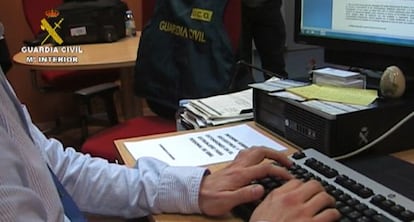The ‘virtual kidnapping’ scam that’s claimed at least 1,500 victims in Spain so far
Investigators have traced threatening phone calls to jailed criminals in South America who demand a quick ransom from victims, convincing them that their loved ones are in danger


Earlier this year, a 69-year-old woman who lives in Madrid received a phone call from a man with a foreign-sounding accent who told her that her daughter had been kidnapped. “Either you pay €10,000 or we’ll send you a video of us cutting off one of your daughter’s fingers,” she was told.
Using very violent language, the caller demanded immediate payment of a large sum of money. Just as the woman was headed for the bank, with the alleged kidnapper still on the line, she was stopped by the police, who had been alerted by her husband. Officers had quickly confirmed that the couple’s daughter was in fact at her workplace, unaware of what was going on.
They start out by demanding €10,000, then typically bring this amount down significantly, sometimes to €500
This is the latest known case of a type of an extortion scheme in which criminals call a person – often randomly selected – and try to convince him or her that they have kidnapped a relative. They start out by demanding €10,000, then typically bring this amount down significantly, sometimes to €500.
In the last five years, Spain has seen 1,474 reported cases of this type of fraud, according to figures released by the Interior Ministry. Half of them took place in 2016, with as many as four a day during the month of July.
The number of reported cases has dropped significantly since then, with 104 recorded in 2018. Last year there was a slight pick-up with 136 reported cases, according to a government reply to a question by a lawmaker from the Basque party EH Bildu. In this period of time, law enforcement agencies have arrested or investigated 17 individuals.
But Chief Inspector Juan Alcolea, of the National Police’s kidnappings and extortion department, notes that this is a type of crime where many cases go unreported. “Many people who don’t pay also don’t file a police report,” he notes.
Alcolea points to another difficulty when it comes to making arrests. “In the vast majority of cases, the perpetrators are not in Spain but in South America, more specifically in Chile.”
Many people who don’t pay also don’t file a police reportNational Police Chief Inspector Juan Alcolea
These are often jailed inmates who have access to cellphones and “randomly dial telephone numbers. There have been cases of calls placed to the headquarters of the [conservative Popular Party], or to Social Security offices. They make lots of failed calls, but so long as one works out, it’s worth it to them.”
The distance is no problem when it comes to receiving the payment, adds this expert, who says a joint investigation team is being created with the Chilean police in a bid to curb the scam.
“The vast majority of times, they urge the victim to go to a call center and wire the money to their country, although we’ve seen a few cases where payment was demanded in [the virtual currency] bitcoins,” says a Civil Guard captain in charge of the homicide and kidnapping department who requested anonymity.
“We cannot stop a criminal sitting inside a prison in Chile, Colombia or Peru from placing a call to Spain,” adds this source. “The key lies in securing cooperation from banks and money-transfer establishments so they will alert us if they see a person walking in who seems very nervous, wants to transfer money, and is on the phone. We are also providing citizens with information so they will know how to proceed if they receive one of these calls.”
In the last five years, experts say that the criminals have perfected their technique. “Sometimes they exploit the fact that victims have shared personal information on social media, to make the story sound more credible,” says the Civil Guard expert.
Both sources consulted by this newspaper said that there is a Mexican form of the fraud, which is more sophisticated as it requires finding Spanish citizens on a trip in Mexico, convincing them to change hotels, then calling their relatives to claim that their loved ones have been kidnapped and are being held at an undisclosed location.
The members of a Spanish music band named Delorean went through this experience in October 2013, when their relatives in the Basque Country were asked for a payment of five million pesos (€300,000). The fraud was stopped by a joint operation of the Spanish and Basque police.
“In 2019, we only know of five cases where people paid up a total of €5,700,” says Chief Inspector Alcolea.
English version by Susana Urra.
Tu suscripción se está usando en otro dispositivo
¿Quieres añadir otro usuario a tu suscripción?
Si continúas leyendo en este dispositivo, no se podrá leer en el otro.
FlechaTu suscripción se está usando en otro dispositivo y solo puedes acceder a EL PAÍS desde un dispositivo a la vez.
Si quieres compartir tu cuenta, cambia tu suscripción a la modalidad Premium, así podrás añadir otro usuario. Cada uno accederá con su propia cuenta de email, lo que os permitirá personalizar vuestra experiencia en EL PAÍS.
¿Tienes una suscripción de empresa? Accede aquí para contratar más cuentas.
En el caso de no saber quién está usando tu cuenta, te recomendamos cambiar tu contraseña aquí.
Si decides continuar compartiendo tu cuenta, este mensaje se mostrará en tu dispositivo y en el de la otra persona que está usando tu cuenta de forma indefinida, afectando a tu experiencia de lectura. Puedes consultar aquí los términos y condiciones de la suscripción digital.








































